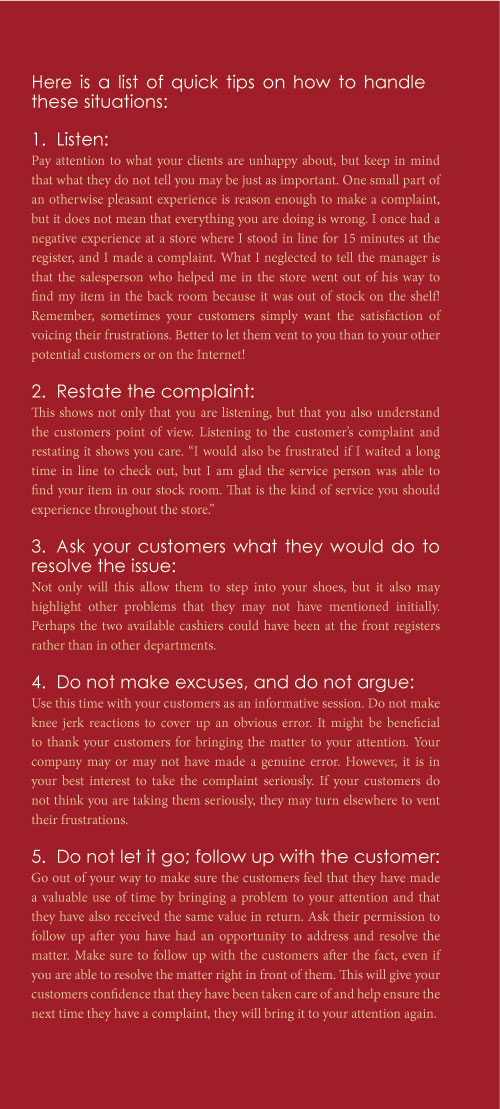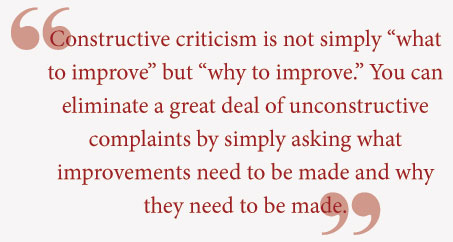If you are like most of the business owners I have talked to over the years, you might be thinking, “If they are complaining about my service or product, they must not like what we do. Why would they be my best customers?”
You are partially right. There will always be a small percentage of your customers who are simply complaining for less than altruistic intentions; they may want a discount or additional services at no cost. You can usually identify these clients pretty readily, and these are not the clients I am talking about. Use caution and your best judgment in dealing with these types of clients.
I am speaking about your diamond in the rough clients who care about your business and want to see it benefit from suggestions, surveys, and complaints. Think back for a moment on the last negative experience you had in a retail setting. Perhaps it was a service person that made a mistake on your order, and you got mashed potatoes instead of the French fries you requested. You may have had a difficult time exchanging a clothing item. Perhaps you were simply the victim of bad service from one of your favorite retail establishments. Unfortunately, we all have had bad experiences in retail. The causes could range from poor training to a disgruntled employee having a rough day. It is happened to almost all of us.
As a consumer, nothing is more frustrating than handing over hard earned cash in exchange for mediocre or downright bad products or services. In recent years, as our budgets have tightened and companies are finding new ways to cut cost, it has become drastically more important for companies to avoid these blunders. Ironically, great service can often help consumers overcome their reservations about purchasing a higher priced item, while poor service can and will drive them permanently away from your business.
Here is where your best clients shine. Will your dissatisfied customers take their business elsewhere without expressing their concerns? Will they take the time to fill out a survey, talk to the manager, or call to make a complaint? If they walk out and never come back, bad news: You just lost in a big way. You have lost your credibility with these clients, along with the money you have invested in marketing and the value of future business with them. To add insult to injury, these clients will likely spread the word of their negative experience to their colleagues for weeks, if not longer.
Statistically, consumers are more likely to remember the single negative experience they have had with a company over all the positive experiences they have had over the years. Remember, even one unaddressed negative experience can mean the loss of a client. Additionally, with the number of online complaint boards, the prevalence of blogging, and even social media websites, that one negative experience can spread instantly to hundreds, or even thousands, of people in just a few short minutes.

Consider the alternative: If your unhappy clients fill out a survey, ask to speak with a manager, or pick up the phone to complain, what are they communicating to you? In short, they are giving you an opportunity to save the relationship and avoid a potential public relations catastrophe. If they tell you why they are unhappy with your service or your product, you will have the opportunity not only to address the issue, but also to ensure that customer comes back to do business with you in the future.

The key to creating this atmosphere for your clients is to start with your employees. You will never hear a customer complaint if you do not train your employees to handle them correctly. Often customers may feel that they have no alternative but to take their negative experiences and vent it to their friends or through the Internet. The reason is very simple: Your customers do not have confidence that you or your employees will truly address the issue.
Many of the biggest and best-known companies have created a culture that uses complaints as constructive criticism for their business. Many companies have taken this a step further by using this constructive criticism from both customers and employees in an ongoing effort to improve their businesses. Everything from a suggestion box to the exit interview has proven to be effective in addressing common complaints.

Great systems should include both internal and external complaints. Embracing customer complaints but ignoring employee complaints just does not make good business sense. Your employees are going to have ideas on how to better serve your clients, so use them. Creating a business environment that utilizes these suggestions tocreate positive experiences for both customers and employees will set you apart from your competition. Employees often make suggestions that may cut costs, improve productivity, or find new products and services that the business can bring to the market.
On a broader scale, addressing internal complaints can increase morale, sales, and profitability. Employees want a sense of security that they are being taken seriously. If they have complaints, use the tips above to address them just as seriously as you would a complaint from one of your clients. Never forget that your company’s employees are often your best clients. They may shop in your store, use your service, or even own stock in the company. Shouldn’t their complaints be taken seriously and addressed?

Design your training programs to address both internal and external complaints. Face it; sometimes it is difficult to hear negative things about the company you work for. The hard truth is that there is always room for improvement. What we often lack is a reason to improve. There are plenty of companies that do not see a potential problem until someone brings it to their attention. This creates a culture in which employees are hesitant to bring up complaints because they do not want to be the first person to do so. Your training needs to address this by creating a culture of constructive criticism.
Constructive criticism is not simply “what to improve” but “why to improve.” You can eliminate a great deal of unconstructive complaints by simply asking what improvements need to be made and why they need to be made.
This is a similar approach to asking a customer for his or her opinion on how to resolve an issue. If you have not been working in an environment that respects complaints, this is a good way to start the transition. Everyone has an opinion, but the employees who truly stand out are the ones who can see a problem and offer a solution. You should give these complaints the same attention you would to those from your clients.
What better way to show we care than to complain and hope for a better experience from the places in which we love to work and shop? These are the customers and employees who stand out by taking the risk to place their concerns in your tender care. They want to know they will be taken seriously and have their complaint addressed. They may have been customers or employees for years, or perhaps they just walked in the door. Either way, thank them for taking the time to bring their complaint to your attention, and do your best to resolve the matter. In many cases, complaints have sparked internal policy changes for Fortune 500 companies, improved standards, reduced costs, or even generated new innovations. Remember, if someone had not complained about a lack of transportation, the wheel might never have been invented! There is always a better way, so use your customer and employee complaints to your advantage.
Michael Lawson is a marketing professional with 12 years experience creating success in small and medium sized businesses. Advocating a principled approach to marketing and relationship building to grow business and create long lasting relationships. He measures success by the number of clients he creates friendships with and believes that without a personal connection your clients may buy somewhere else. Lawson has A Bachelors degree in Psychology and an Associates degree in Criminal Justice.
Want to read more?
Subscribe to one of our monthly plans to continue reading this article.